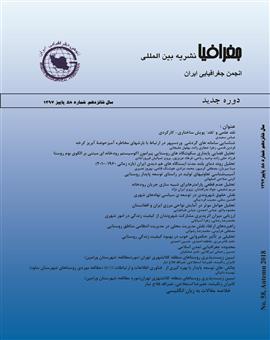نقش حقوق شهروندی در توسعه ی سیاسی نهادهای شهری (مورد پژوهی؛ شهرداری تهران)
محورهای موضوعی :افشین متقی دستنایی 1 , مصیب قره بیگی 2
1 - دانشگاه خوارزمی
2 - دانشگاه تهران
کلید واژه: شهروندی, قانون¬, گرایی, مسئولیت¬, پذیری, شفاف¬, سازی, شایسته¬, سالاری, شهرداری تهران,
چکیده مقاله :
اهمیت حقوق شهروندی، امروزه تا بدان حد است که وجود آنرا به مثابه ی یکی از مهمترین الزامات و عناصر دموکراسی به شمار می آورند. گذار از حکومت های نظامی، خودکامه و تمامیت خواه با مشی سرکوب گری، یکه سالاری و عدم رواداری به سوی شیوه هایی از حاکمیت دموکراتیک، ضرورت پرداخت عمیق به حقوق شهروندی را آشکار ساخته است. از این روی، بررسی حقوق شهروندی در حاکمیت شهری می تواند زوایای پراهمیتی از کیفیت پراکنش دموکراسی را در فضای شهری آشکار سازد. پژوهش حاضر با بررسی چهار شاخص «مسئولیت پذیری»، «شفاف سازی»، «شایسته سالاری» و «قانون گرایی» در مدیریت سیاسی کلانشهر تهران، کوشیده است تا ابعاد حقوق شهروندی در مجموعه ی شهرداری تهران را به عنوان مهمترین نهاد مدیریتی و حاکمیتی این شهر مورد کندوکاو قرار دهد. تحقيق حاضر، از لحاظ ماهیت، بنیادی-کاربردی و از لحاظ روش، توصیفیِ ژرفانگر (پیمایشی) است. تعداد نمونه ی شهروندان با توجه به تعداد جامعه ی آماري، بر اساس فرمول كوكران انجام شده و تعداد 113 نفر از شهروندان منطقه ی 6 شهرداری تهران بر اساس روش نمونه گیری خوشه ای به عنوان نمونه با پرسش نامه مورد پرسشگري قرار گرفته اند. نتایج این پژوهش، نشانگر آن است که میزان رضایت شهروندان از حقوق شهروندی بر اساس شاخص های پژوهش، افت محسوسی داشته است و در مجموع، شاخص «قانون-گرایی» نسبت به سه شاخص دیگر در وضعیت خوشایندتری قرار دارد.
Today, citizenship rights is one of the main requirements of democracy. The transition from military-authoritarian regimes towards a democratic governance has shown the necessity of paying profound to civil rights. Hence, investigation of civil rights in urban governance can demonstrate important aspects of the quality of democracy dispersion in urban areas. The present study examined four indicators of "accountability", "transparency", "meritocracy" and "legalism" in the political management of metropolitan of Tehran and has tried to analyze the rights of citizens in the municipality of Tehran as the governing body and the city government. The study is an applied and descriptive survey. The sample of citizens selected according to the number of statistically based sampling formula Cochran, a total of 513 residents of the 6th district of Tehran. The number of regions in 2015 selected on the basis of cluster sampling method. The results show that on the basis of indicators of the research, satisfaction of citizens' civil rights has fallen and indicator of "legalism" is better than the three other indices, generally.
1. بیرامی، موسی (1391)، «نقش شایسته¬سالاری در عرصه مدیریت»، فصلنامه¬ی دانش انتظامی کردستان، دوره 3، شماره 9، صص 69-58.
2. جعفري لنگرودي، محمدجعفر (1380)، «فلسفه حقوق مدنی»، جلد اول، تهران: انتشارات کتابخانه گنج دانش، 381 صفحه.
3. حافظ¬نیا، محمدرضا و مراد کاویانی راد (1393)، «فلسفه¬ی جغرافیای سیاسی»، تهران: انتشارات پژوهشکده¬ی مطالعات راهبردی، 290 صفحه.
4. رمضانی، رضا (1378)، «نظام شایسته¬سالار در مدیریت کشور»، تهران: سازمان امور اداری و استخدامی کشور
5. علوی، سیدمصطفی (1390)، «تاثیر سطوح شفافیت اطلاعات بر میزان پاسخ¬گویی مدیریت»، فصلنامه¬ی اقتصاد و حسابداری، سال 7، شماره 14، صص 78-69.
6. فقیهی، ابوالفضل و بهروز رضایی منش(1384). «اخلاق اداری»، مطالعات مدیریت بهبود و تحول، دوره 9، شماره 47، صص 25-38.
7. فکوهی، ناصر(1383)، «انسان¬شناسی شهری»، تهران: نشر نی، 608 صفحه.
8. کاویانی راد، مراد و قره¬بیگی، مصیب (1396)، «جغرافیای انتخابات: بنیادها، مفاهیم و رویکردها»، تهران: انتشارات مرکز مطالعات راهبردی، 280صفحه.
9. لنگ، جان(1381)، «آفرینش نظریه¬ی معماری: نقش علوم رفتاری در طراحی محیط»، ترجمه¬ی علیرضا عینی¬فر، انتشارات دانشگاه تهران، 328 صفحه.
10. معمارزاده، غلامرضا، نجف بیگی، رضا و یدالله عباس زاده (1391)، «تبيين مدل ارتقاء شايسته¬سالاري و عوامل مرتبط با آن در وزارت بهداشت درمان و آموزش پزشکي»، فصلنامه¬ی مديريت بهره¬وري (فراسوي مديريت)، دوره 5، شماره 20، صص 41-33.
11. موسوی، سید صمد(1393)، «شایسته¬سالاری در حکومت دینی»، بازنشر در دانشنامه¬ی موضوعی قران، قابل دسترسی در: http://maarefquran.org/index.php/page,viewArticle/LinkID,4252
12. میرحیدر، دره (1386)، «مفاهیم بنیادی در جغرافیای سیاسی»، تهران: انتشارات سازمان جغرافیایی نیروهای مسلح، 228 صفحه.
13. Bacchi, C.L and Beasley C. (2000). Citizen bodies: Is embodied citizenship a contradiction in terms? Critical Social Policy, 22(2), pp. 324-352
14. Bell, D. (2000). On Meritocracy and Equality. The Public Interest. pp. 29-68.
15. Brenner, N. (2005). New State Spaces: Urban Governance and the Rescaling of Statehood. Oxford: Oxford University Press
16. Bressman, L.S. (2003). Beyond Accountability: Arbitrariness and Legitimacy in the Administrative State, New York University Law Review, 46(1), pp.1-13.
17. Brown, M. (1997). Re-Placing Citizenship: AIDS Activism and Radical Democracy. New York: The Guilford Press
18. Burchell, D. (2014). The attributes of citizens: Virtue, manners and the activity of citizenship. Economy and Society, 24, pp. 540-558
19. Dickinson, J. and Bailey, A.J. (2007). (Re)membering diaspora: Uneven geographies of Indian dual citizenship. Political Geography. 26(7), pp. 757-774
20. Hassner, P. (1997). Obstinate and obsolete: non-territorial transnational forces versus the European territorial state. In O. Tunander and others. (eds.) Geopolitics in the Post-Wall Europe: Security, Territory and Identity. London: Sage
21. Lerner, J. and Tetlock, P.E. (2004). Accountability and social cognition. Encyclopedia of Human Behavior. New York: Academic Press
22. McEwan, C. (2000). Engendering citizenship: Gendered spaces of democracy in South Africa. Political Geography19, pp. 627-651.
23. Munro, K. and Mouritsen, D. (1996). Accountability: power, ethic and technology of meaning, London: International Thompson Business
24. Paasi, A. (2008). Territory. In John Agnew, Katharyne Mitchell and Gerard Toal (eds.) Companion to Political Geography, New York and London: Blackwell
25. Valentine, G. and Skelton, T. (2007). The right to be heard: Citizenship and language. Political Geography, 26(2), pp. 121-140.


